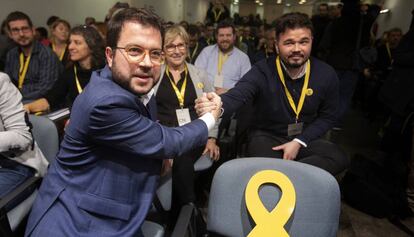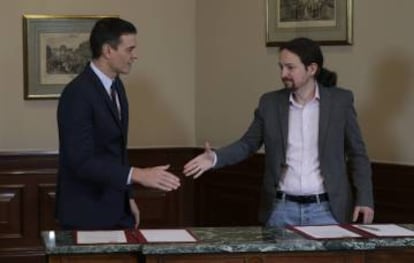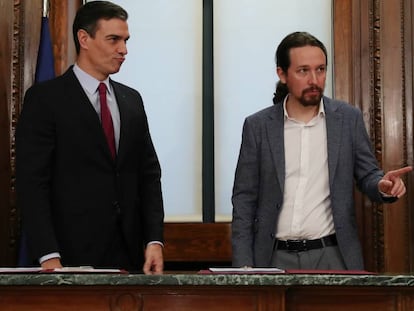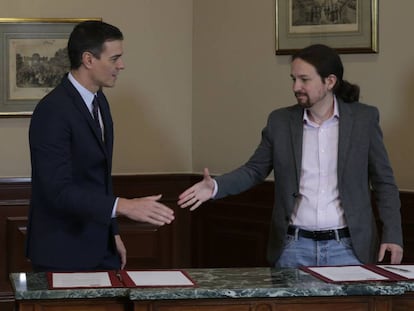Catalan separatists give green light to new Socialist government in Spain
The national council of the Catalan Republican Left has agreed to abstain at the investiture vote of Pedro S¨¢nchez, who will likely become prime minister once more on Tuesday

The Catalan Republican Left (ERC) party on Thursday agreed that it would abstain at this weekend¡¯s investiture vote in Spain¡¯s lower house of parliament, the Congress of Deputies, paving the way for Pedro S¨¢nchez of the Socialist Party (PSOE) to be voted back in as prime minister.
The decision was taken yesterday by the national council of the ERC, a party from the northeastern Spanish region that supports independence for Catalonia and holds the key to S¨¢nchez getting back into power thanks to its 13 deputies in Congress.
The presence of the Spanish prime minister and the Catalan regional premier at the talks will not be essential
S¨¢nchez won the November 10 repeat election but, as at the previous vote in April, fell short of an absolute majority. Since the polls last fall he has been seeking the support of other parties to be voted back in to office. S¨¢nchez quickly closed a coalition deal with Unidas Podemos, but talks with ERC have been long and arduous, and of course have been complicated by the fact that the party¡¯s leader, Oriol Junqueras, is currently in jail for his role in the 2017 Catalan independence drive.
On Thursday a majority of the attendees at the national council meeting voted in favor of abstaining at the vote ¨C just three people voted against from a total of 203. In exchange, the PSOE has committed to negotiations about the political situation in Catalonia and the future of the region.

The text of the deal sets out a forum with no restrictions on the content of discussions, and that will get going 15 days after the new government is formed. Any deals reached, according to the text, will be subject to a vote by citizens of Catalonia. The presence of the Spanish prime minister and the Catalan regional premier at the talks will not be essential, according to the agreement. The text avoids making specific reference to the Constitution, although it does state that any possible deal will have to comply with ¡°the framework of the legal-political system.¡±
The text makes clear that for the PSOE, the situation in Catalonia is a ¡°political conflict,¡± a definition that the ERC wanted included from the outset of their negotiations. The deal also paves the way for more ¡°bilateral¡± forums between Madrid and regional governments to deal with specific issues.
One notable absence from the deal is an independent ¡°rapporteur¡± at the talks, to mediate between the two sides. The possibility of such a figure at the negotiations caused huge controversy just under a year ago among the political opposition, and set off a chain of events that eventually culminated in support for S¨¢nchez¡¯s budget plans crumbling, and the calling of last year¡¯s April general election.
The text makes it clear that for the PSOE, the situation in Catalonia is a ¡°political conflict¡±
The first of two investiture debates will now take place on Saturday and Sunday. S¨¢nchez will set out his policies if voted back in to office, and opposition leaders will have a chance to respond. A vote will be held on Sunday, at which the PSOE chief would need an absolute majority of 176 votes in the 350-seat chamber to prosper. This is highly unlikely to happen, meaning that there will be a second, shorter debate on Tuesday, and then a second vote at which a simple majority ¨C more yes votes than no ¨C is required .
With the votes of his own party and those of coalition partner Unidas Podemos, as well as the support of a smattering of smaller groups and the abstention of ERC, the stage is now set for Pedro S¨¢nchez to once again be prime minister ¨C barring any last-minute surprises. Should his bid fail, Spain could be facing its third general election in a year ¨C the fifth in five years.
English version by Simon Hunter.
Tu suscripci¨®n se est¨¢ usando en otro dispositivo
?Quieres a?adir otro usuario a tu suscripci¨®n?
Si contin¨²as leyendo en este dispositivo, no se podr¨¢ leer en el otro.
FlechaTu suscripci¨®n se est¨¢ usando en otro dispositivo y solo puedes acceder a EL PA?S desde un dispositivo a la vez.
Si quieres compartir tu cuenta, cambia tu suscripci¨®n a la modalidad Premium, as¨ª podr¨¢s a?adir otro usuario. Cada uno acceder¨¢ con su propia cuenta de email, lo que os permitir¨¢ personalizar vuestra experiencia en EL PA?S.
?Tienes una suscripci¨®n de empresa? Accede aqu¨ª para contratar m¨¢s cuentas.
En el caso de no saber qui¨¦n est¨¢ usando tu cuenta, te recomendamos cambiar tu contrase?a aqu¨ª.
Si decides continuar compartiendo tu cuenta, este mensaje se mostrar¨¢ en tu dispositivo y en el de la otra persona que est¨¢ usando tu cuenta de forma indefinida, afectando a tu experiencia de lectura. Puedes consultar aqu¨ª los t¨¦rminos y condiciones de la suscripci¨®n digital.










































